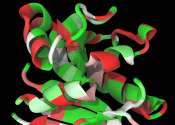Not so simple: Mosses and ferns offer new hope for crop protection
Mosses, liverworts, ferns and algae may offer an exciting new research frontier in the global challenge of protecting crops from the threat of disease.

Mosses, liverworts, ferns and algae may offer an exciting new research frontier in the global challenge of protecting crops from the threat of disease.
Biotechnology
14 hours ago
0
1

Oak Ridge National Laboratory scientists have developed a method leveraging artificial intelligence to accelerate the identification of environmentally friendly solvents for industrial carbon capture, biomass processing, ...
Analytical Chemistry
Jul 9, 2024
0
0

A research team has developed a novel method combining computer vision and deep learning to phenotype drought-stressed poplar saplings, achieving 99% accuracy in variety identification and 76% accuracy in stress-level classification.
Molecular & Computational biology
Jul 9, 2024
0
0

Researchers from the University of Twente in the Netherlands have gained important insights into photons, the elementary particles that make up light. They 'behave' in an amazingly greater variety than electrons surrounding ...
Optics & Photonics
Jul 8, 2024
1
250

Researchers at Tel Aviv University relied on principles of origami, the Japanese art of paper folding, to develop an original and innovative solution for a problem troubling researchers worldwide: positioning sensors inside ...
Biotechnology
Jul 8, 2024
0
57

The rapid development of single-cell RNA sequencing technologies has made it possible to study the impact of external perturbations on gene expression at the level of individual cells.
Biotechnology
Jul 8, 2024
0
0

Researchers at Nano Life Science Institute (WPI-NanoLSI), Kanazawa University report the 3D imaging of a suspended nanostructure. The technique used is an extension of atomic force microscopy and is a promising approach for ...
Bio & Medicine
Jul 5, 2024
0
99

If you scroll through the average student's digital textbook or reading, you will probably see multi-colored streaks scattered everywhere. However, new research reveals that excessive highlighting may do more harm than good.
Education
Jul 5, 2024
0
2

A new study led by Rice University's Peter Wolynes offers new insights into the evolution of foldable proteins. The research was published in the Proceedings of the National Academy of Sciences.
Molecular & Computational biology
Jul 3, 2024
0
210

Speech recognition, weather forecasts, smart home applications: Artificial intelligence and the Internet of Things are enhancing our everyday lives. Systems based on reservoir computing are a very promising new field.
Condensed Matter
Jul 3, 2024
0
79
A computer is a machine that manipulates data according to a set of instructions.
Although mechanical examples of computers have existed through much of recorded human history, the first electronic computers were developed in the mid-20th century (1940–1945). These were the size of a large room, consuming as much power as several hundred modern personal computers (PCs). Modern computers based on integrated circuits are millions to billions of times more capable than the early machines, and occupy a fraction of the space. Simple computers are small enough to fit into a wristwatch, and can be powered by a watch battery. Personal computers in their various forms are icons of the Information Age and are what most people think of as "computers". The embedded computers found in many devices from MP3 players to fighter aircraft and from toys to industrial robots are however the most numerous.
The ability to store and execute lists of instructions called programs makes computers extremely versatile, distinguishing them from calculators. The Church–Turing thesis is a mathematical statement of this versatility: any computer with a certain minimum capability is, in principle, capable of performing the same tasks that any other computer can perform. Therefore computers ranging from a mobile phone to a supercomputer are all able to perform the same computational tasks, given enough time and storage capacity.
This text uses material from Wikipedia, licensed under CC BY-SA